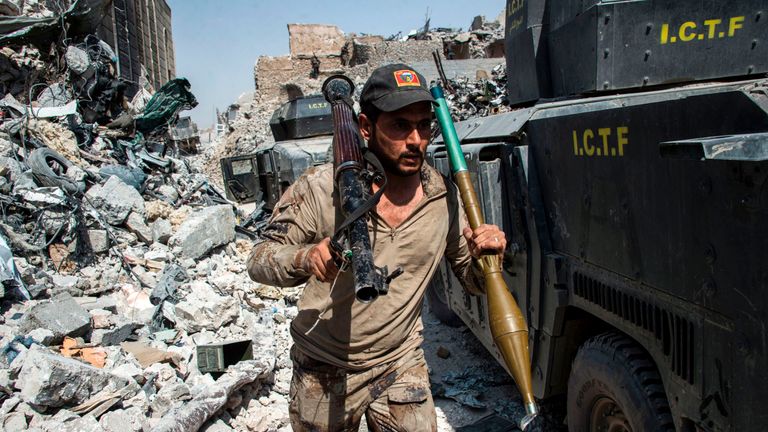Iraqi-Kurdish tensions could explode into something far more serious
With Islamic State still a threat in Iraq, the US-backed coalition does not want two key allies fighting amongst themselves.
Monday 16 October 2017 18:20, UK
For months Kurds and Iraqis have been on the same side in a bitter protracted battle to defeat Islamic State in Mosul.
Before the dust from that victory has even settled they are now turning on each other.
Flushed with success against IS, Iraqi armour, special forces and infantry swung towards the Kurdish controlled city of Kirkuk a few days ago and have taken its airport, military base and oil installations.
The coming hours and days will be crucial. Is the Iraqi government reasserting control over only Kirkuk or planning to move deeper into Kurdish controlled territory?
Kurds have wanted their own independent state for a century. When the Turkish Ottoman Empire was carved up after World War One, the Kurds believe they were promised their own homeland. Instead their land was divided between Iran, Iraq and Turkey.
They have been abused and mistreated by each of the governments that have dominated them over the years. Saddam Hussein used sarin gas and mustard gas to kill as many as 5,000 of them.
But in the post-Saddam era, their dreams of Kurdistan have waxed again. At times the only force able to field and maintain a potent fighting force.
They have expanded their areas of influence, asserting control over Kirkuk after IS routed the Iraqi army in the north of the country in 2014.
A few weeks ago they held an independence referendum, worrying all the region's big powers. Baghdad has had enough.
The Kurdish areas are oil rich and control the oil transportation routes, quite apart from the spectre of the country being partitioned.
The Iraqi government is determined to put the Kurds back in their box.
It is confusing to watch. American armed and trained Iraqi forces moving against American armed and trained Kurdish forces.
The US is understandably anxious to soothe tensions. The fighting has been, they say, "just a misunderstanding".
IS may be beaten in Mosul but it remains a threat in other parts of Iraq.
The US-backed coalition does not want two key allies fighting amongst themselves instead of against their common enemy.
There is a greater danger. Among the Iraqi military units are Shia militia, armed and trained by Iran, responsible for atrocities elsewhere against Sunni Arabs.
If they do the same against the Kurds, sectarian tensions could explode into something far more serious.
But the big question remains, will Iraq be happy only with taking Kirkuk?
If they push onto Erbil or Suleimaniyah, they can expect a much bigger fight and the region will see a larger conflict - whatever the Americans have to say.








